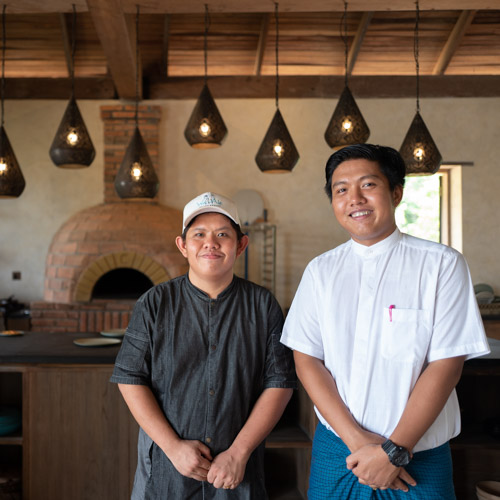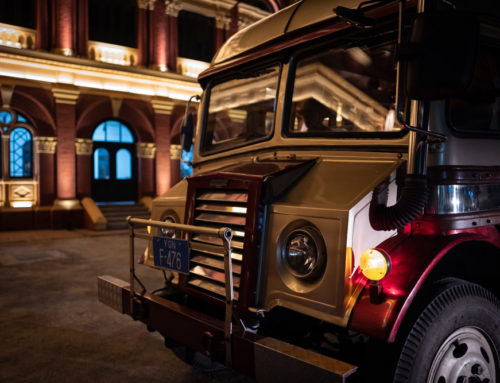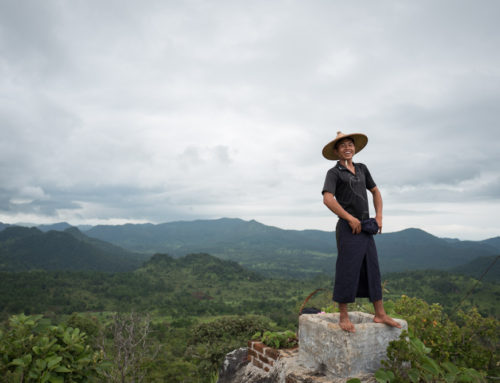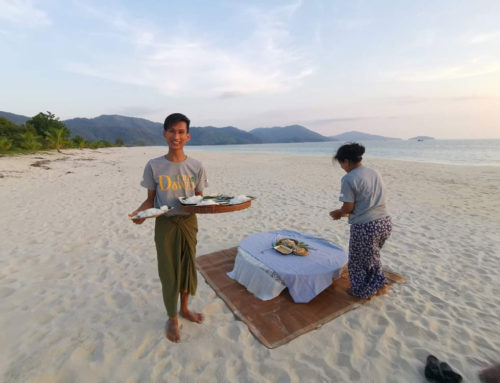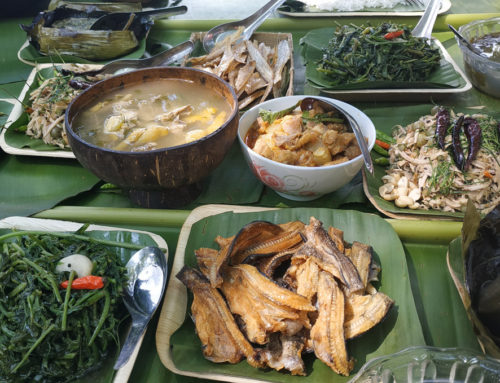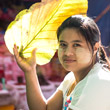WA ALE, AN IN-DEPTH REVIEW
Tour Mandalay recently had the pleasure of staying overnight at Wa Ale, Myanmar’s first barefoot luxury eco-resort.
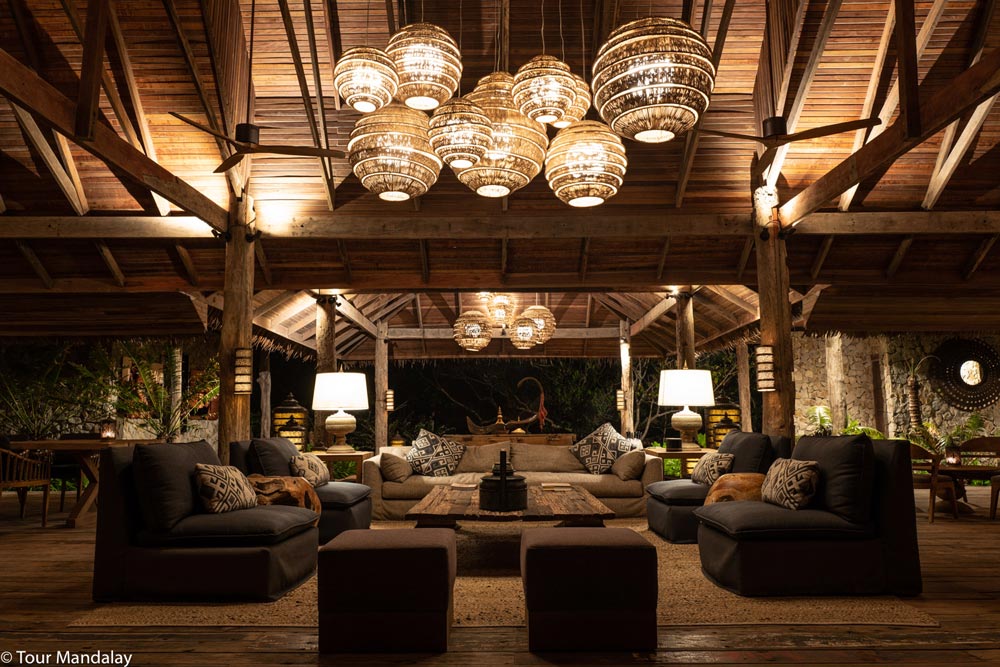
Wa Ale’s lounge and welcome lobby
Not wanting to succumb to the hype without having tested it out for ourselves, we were delighted to find something so utterly unique, personal, responsible and independent in nature. Move over Aman, Soneva and Six Senses, Wa Ale’s just published a revised textbook on how to build a luxury resort and you need to take note.
Location
With over 800 islands making up the Mergui Archipelago, it’s a challenge to know where to start, especially if you only have a two week time frame and classic sights such as Yangon, Bagan, Mandalay, Inle Lake and Kayah State to tick off.
Let us make the decision a little bit easier for you.
The archipelago’s number one attraction (by far!) is the Lampi Marine National Park, Myanmar’s only protected marine national park. This is one of the few truly untouched islands of the region, where tangled mangroves preserve precious marine habitat and verdant jungle provides refuge to myriad endangered species.
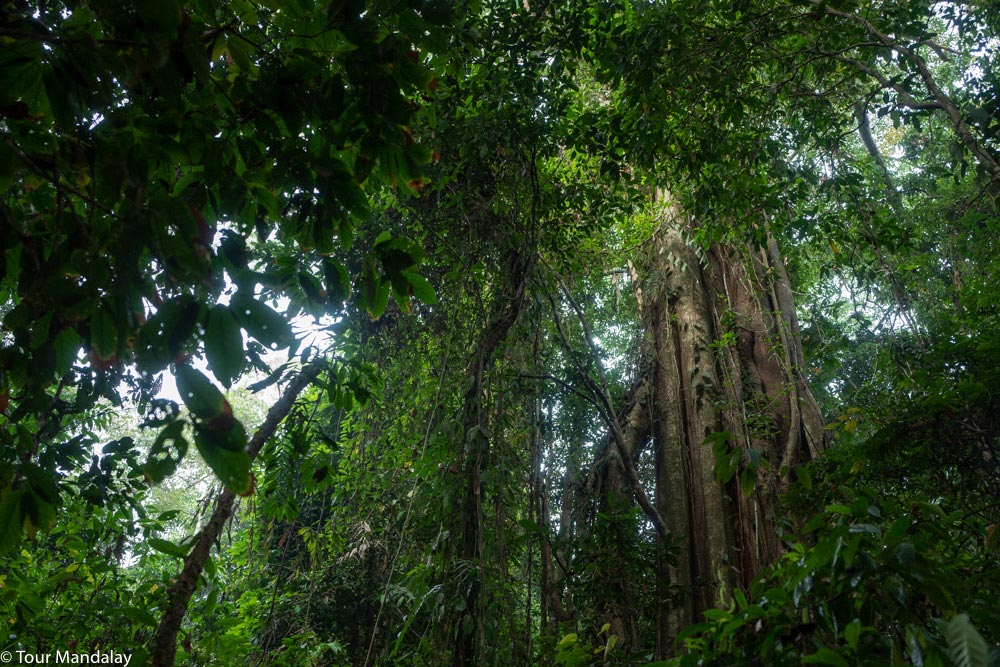
Getting tangled up with the creeping jungle vines
This is also where you’ll find Wa Ale, the best place to stay ‘grounded’ in the entire region, and that’s without even considering the resplendent accommodation you’ll find. Using this as a base, you’re free to dive, hike, bird spot, witness sea turtles hatch and come face to face with the nomadic Moken ‘sea gypsies’ whom temporarily inhabit a small handful of islands nearby.
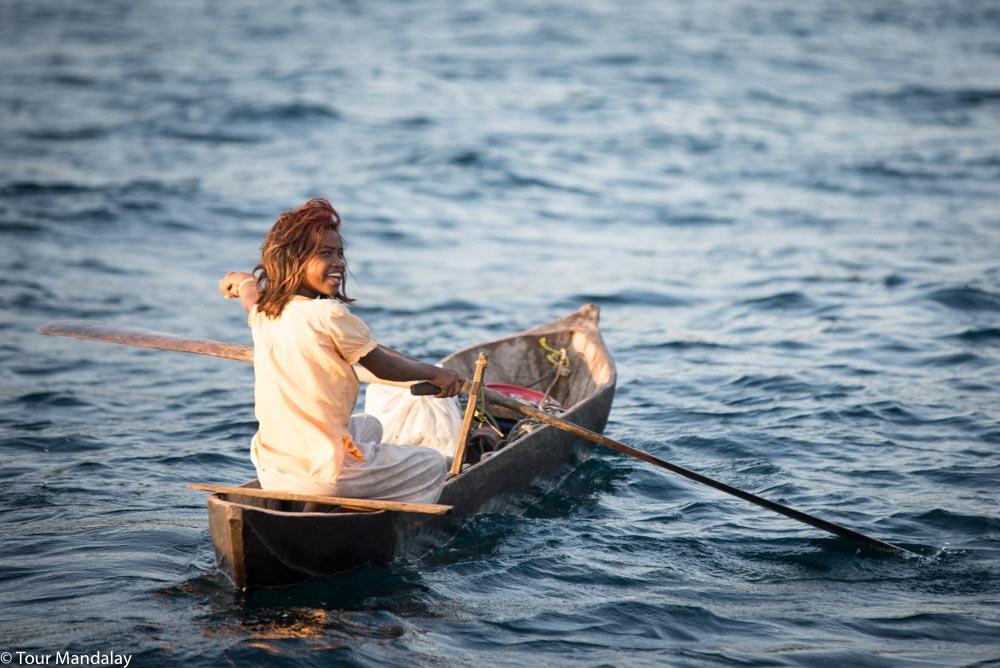
A Moken lady greets us with a beaming smile
A little bit of a background
Unlike the aforementioned resorts, you won’t find a Wa Ale-branded property anywhere else in the world; there is only one. It’s this grassroots, one of a kind nature that gives you confidence that Wa Ale’s true to its purpose, which is to establish a luxury eco-resort that doesn’t negatively impact the environment in any way whatsoever. It’s not just marketing, it’s an ethos that runs deep in the veins of its staff and defines every single business and operating decision.
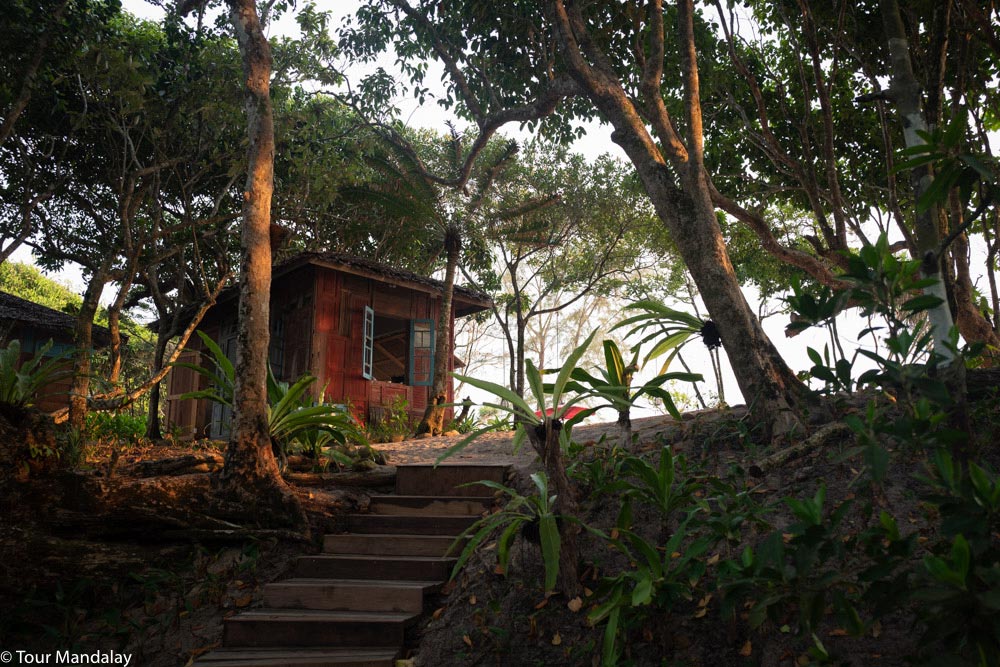
Wa Ale have chosen to work with nature, not against it
For a long time, we were openly sceptical as to whether or not Wa Ale could pull off their ambitious plans; whilst the region’s remoteness is of course one of its major draws, it’s also what quickly thwarts most businesses looking to set up and operate here. The seasonality of it all doesn’t help either; from June to September, the islands become inaccessible due to the Andaman Sea’s choppy waters, so much so, that even the Moken navigate with caution.
Another problem with the Mergui Archipelago’s vast and remote nature is that, for decades, the region’s precious ecology has been damaged by general mismanagement and unregulated fishing; up until recently, coral bombing and electrofishing were regular practises, and discarded fishing nets can frequently be found choking the life out of marine life and coral.
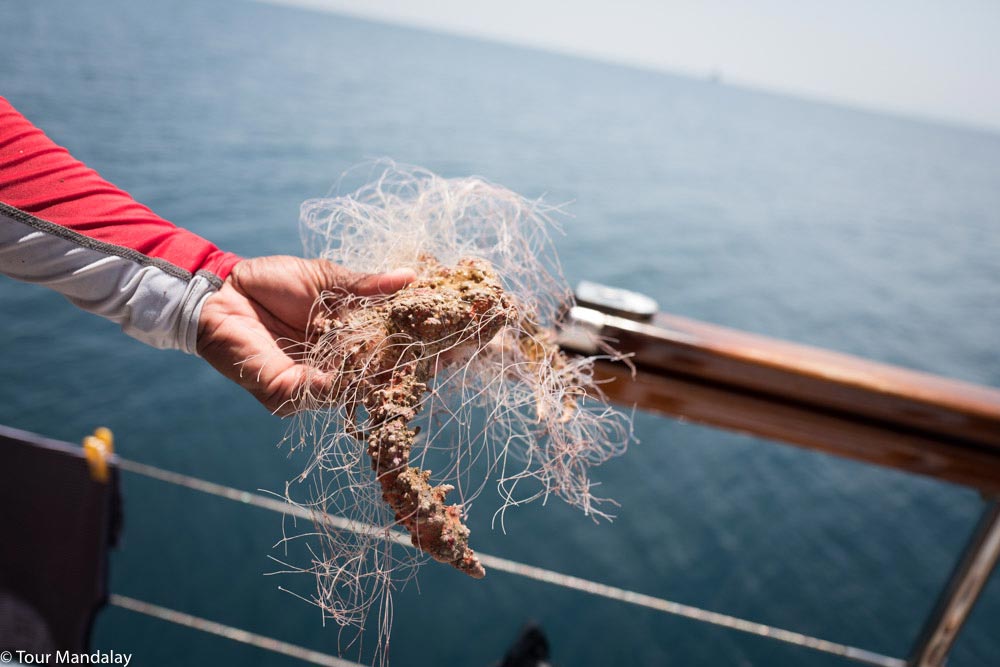
A crab tangled in net; thankfully it was cut free and survived
We appreciate that doesn’t paint a great picture, but it’s for exactly this reason that you should travel here and support legitimately responsible properties such as Wa Ale. Thanks to the exposure ushered in by tourism, we’ve already seen a decline in these illegal practises, coral replenished, medical clinics and schools established, and the conservation of endangered wildlife such as the sea turtle (of which Myanmar boasts five of the world’s seven species).
Introducing your hosts
In keeping with its ‘one of a kind’ identity, you’ll also be wined and dined by one of a kind hosts.
Management of the island has been entrusted to Ray and Alyssa Wyatt, a magical husband and wife team hailing from the United Kingdom and United States. Alyssa, the Resort Manager, takes care of guest relations and general management, whilst Ray as Executive Chef, is responsible for cooking up a storm in the kitchen. The couple are indispensable and this was quickly made apparent from the warm welcome we received from Alyssa and the slap-up, gourmet lunch served by Ray immediately on arrival. More on Ray’s food later.

Ray and Alyssa Wyatt
‘The Family’, as Alyssa refers to her staff, also deserve a special mention. Even on the few occasions Alyssa and Ray weren’t around (they’re human and need to take breaks) everything just seemed so well-oiled and coherent; seeing as they only opened six months prior to us staying, we thought this was remarkable. It’s hard enough accomplishing this in Yangon, let alone when you’re stranded together for months on end out at sea.
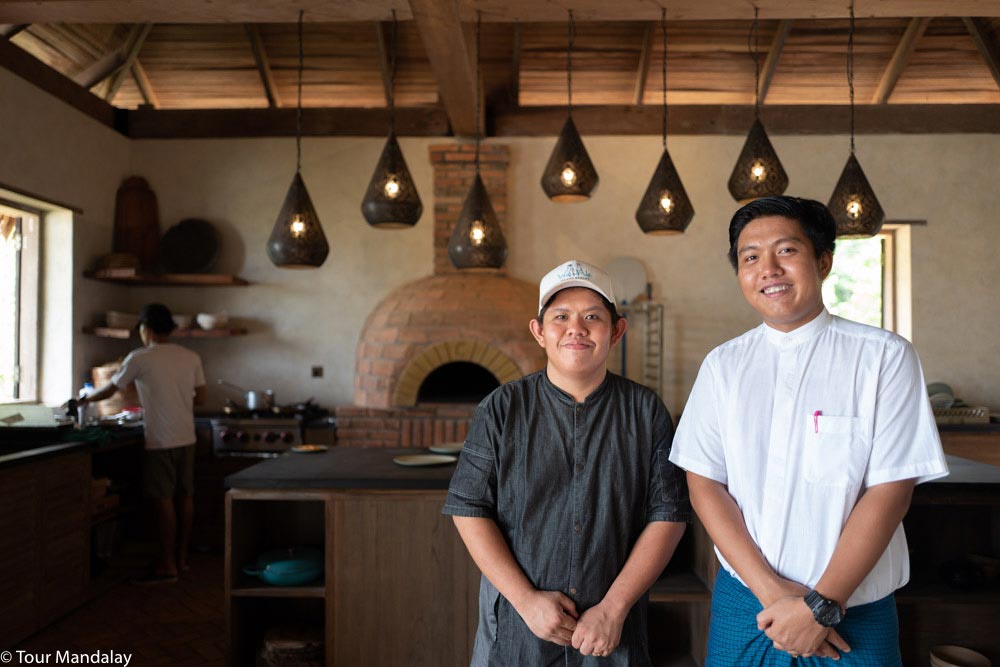
Brothers Aung Soe and Win Thu
You will also find highly qualified professionals such as Alexander, ‘The Naturalist’, who’s responsible for conserving the island’s precious jungle habitat, monitoring sea turtle nests and leading hikes. Greg and Aqhari from the dive team can be found in the dive centre, where snorkelling and deep sea dives can be arranged; will you be one of the lucky few to lay eyes on a whale shark? Have a few aches and pains that need taking care of? Between them, Laurel (‘The Wellness Specialist’) and Sisi (‘The Masseuse’) have got you covered.
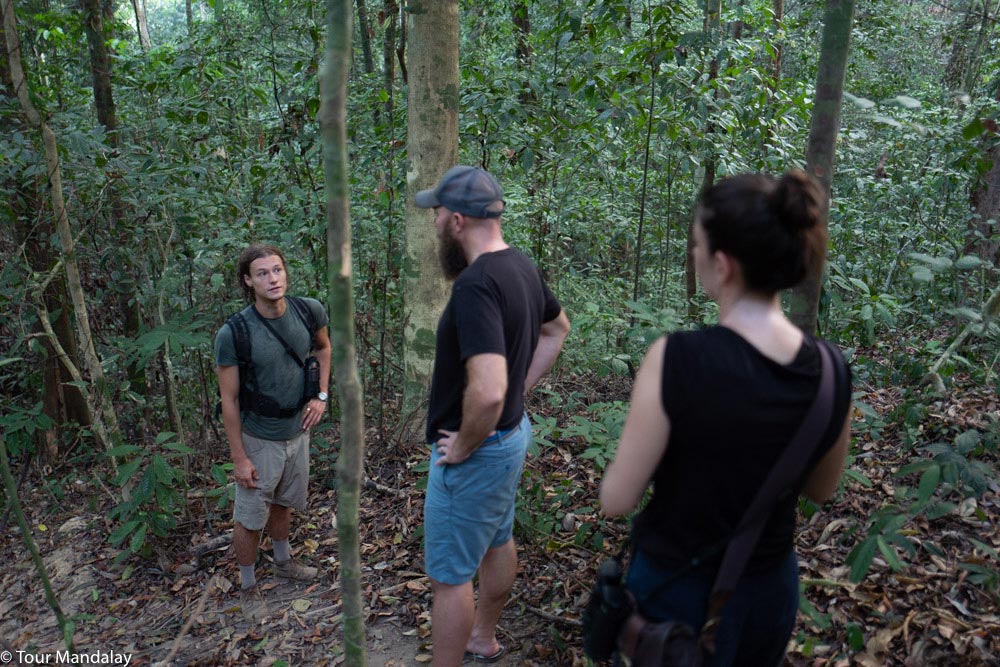
Alexander ‘The Naturalist’ leads a morning trek through the jungle
Extended members of the Wa Ale family include Salami, Mellow and Mamma. These friendly canines are free to roam the resort, along with the caretaker’s dog, Jabo, who wears a small bib; he uses this to pick up any small bits of litter that wash up on shore (another problem that tourism to the region will hopefully help tackle).
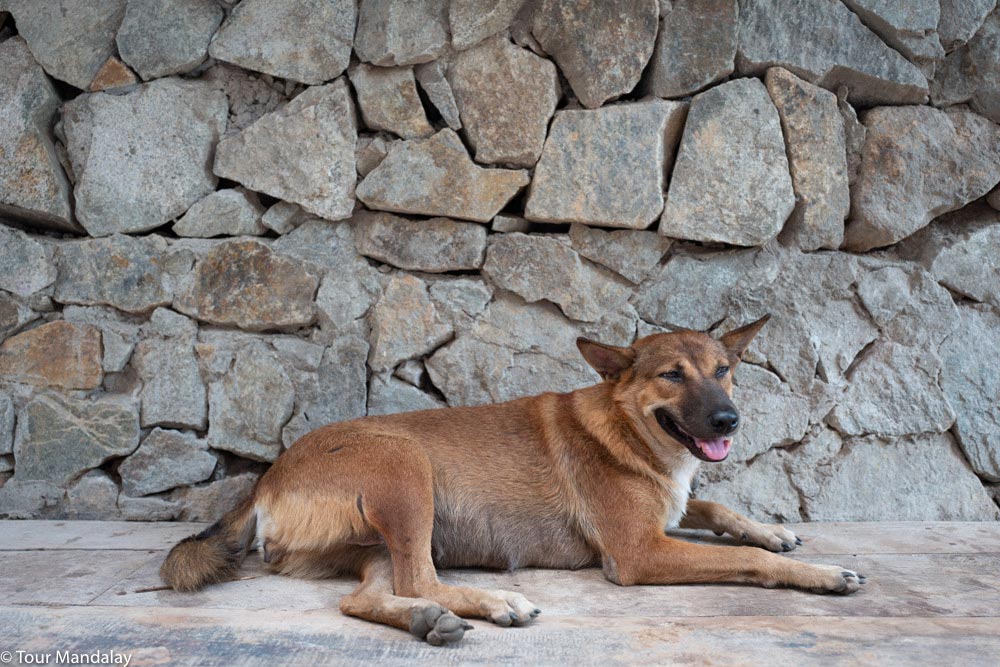
Salami, an extended canine Wa Ale family member
Villas
Wa Ale boasts 11 Tented Beach Villas and two intimate Treetop Villas, each having been designed and placed with careful consideration of the environment; in testament to Wa Ale’s ethos, not one tree was cut down in the process.
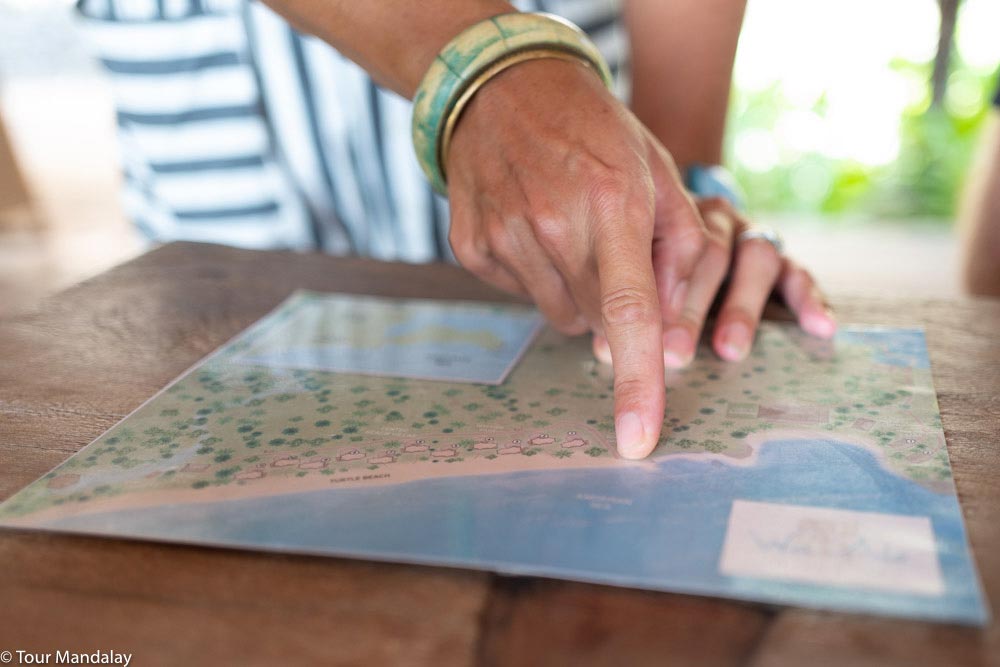
A guided overview
Looking at the image above, the Treetop Villas can be found in the small cove to the left of Alyssa’s finger (looking at it from her perspective) and this is where you’ll also find the central restaurant / lounge area. The Tented Beach Villas on the other hand, can be found dotted to the right of Alyssa’s finger (again, looking at it from her perspective).
Which villa will best suit you? Hopefully the following will help you to make up your mind.
Treetop Villas
Aesthetically speaking, this is Wa Ale’s most unique room type; constructed using reclaimed wood, these look like they’ve been floating alongside the surrounding trees for eons. The rusticity of design helps with this, as does the 100% wooden construction. It’s also the lowest priced villa, starting at approximately USD400 per person a night in low season (October, November, April and May).
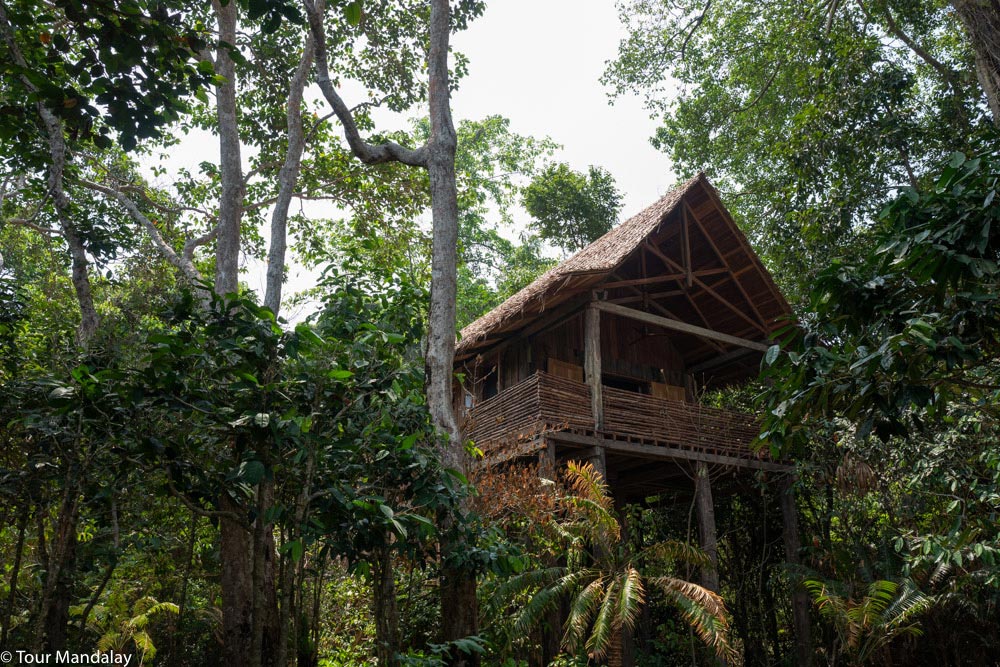
Wa Ale’s Treetop Villa
As mentioned above, the Treetop Villas are just a short walk from Wa Ale’s restaurant / lounge area, making them a convenient option for those looking to seriously overindulge in Ray’s food and the inclusive alcoholic beverages.
Both Treetop Villas have partial views of the sea, with one slightly more open than the other. There is little in it though and the advantage of having more tree cover means slightly more shade.
If there was an award for ‘Best Suited Accommodation in Myanmar for Honeymooners’, these would get our vote. They feel a bit more private due to their suspended nature, they’re close to the bar, there’s a spacious balcony, and it’s hard to find a more romantic setting than a tree house. Furthermore, the Treetop Villas can only accommodate a maximum of two guests, which means you won’t get any families staying nearby.
When it comes to furnishing the villas, no expense has been spared. All furniture and fabric has been sourced from the California-based artisans, Brownstone Furniture; the bespoke nature, along with their signature ‘classic meets contemporary’ style, compliments the villas with oomphs of freshness, character and class.
The Treetop Villa’s open-air bathrooms are a little bit smaller and more enclosed, but you still get that exhilarating feel of baring it all to nature; fear not, aside from the occasional macaque and giant squirrel, nobody else can see!
Tented Beach Villas
Over twice the size of the Treetop Villa (1,500 square foot as opposed to 560), the Tented Beach Villas are delightfully spacious with a separate living area, large front and back decks, an ensuite bathroom with two vanity sinks, and perhaps best of all, an outdoor shower set within a privately enclosed garden.
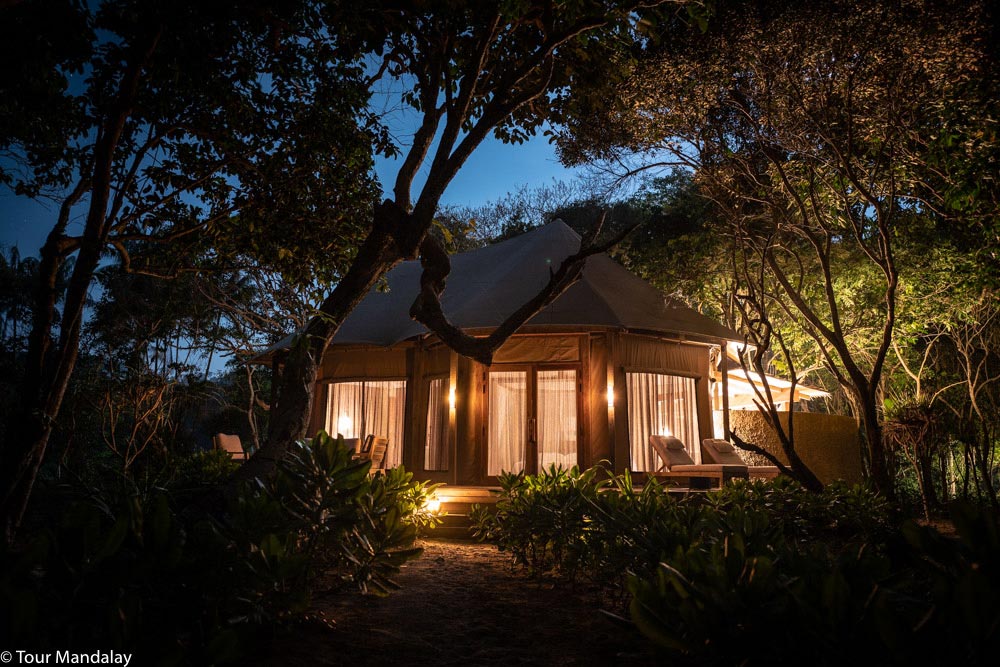
Wa Ale’s Tented Beach Villa, an inviting sight
Starting at approximately USD560 per person a night in low season (October, November, April and May), they’re surprisingly not that much more expensive and would ideally suit individuals looking for more space and those travelling with a family in tow. On that note, the Tented Beach Villas can accommodate four guests maximum; two adults and two children between the ages of 8-17.
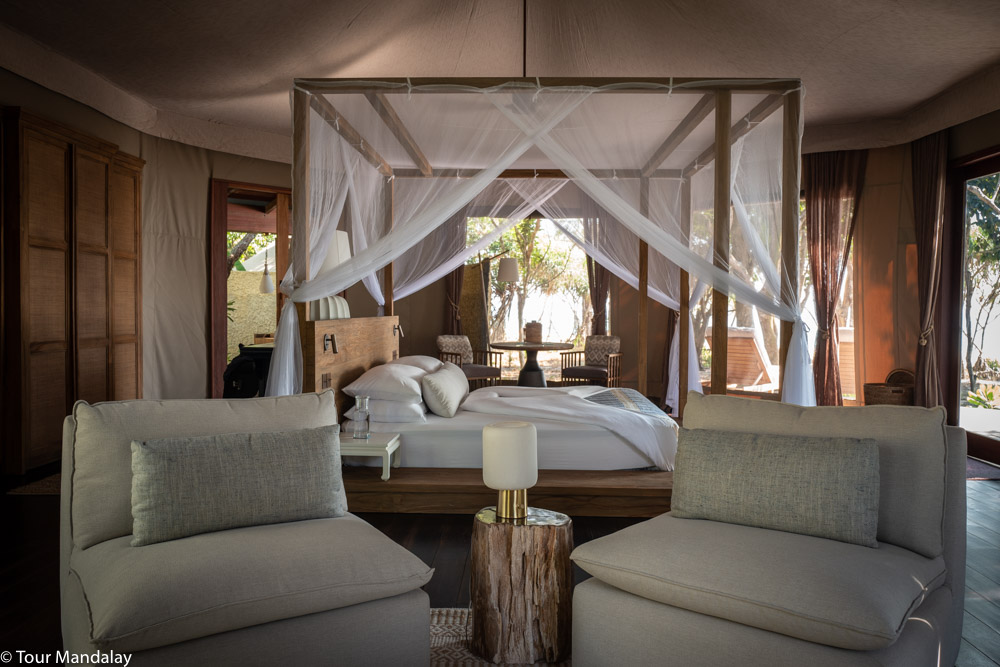
The interior of Wa Ale’s Tented Beach Villa
Each of the 11 khaki coloured canvas tents look out onto the Andaman Sea, with some set back a little bit further than others. Again, Wa Ale has purposely chosen not to cut down any of the island’s trees, so the placement of everything is very much dependent on that. As mentioned above, another benefit of allowing trees to grow is the presence of shade, which you’ll be especially appreciative of in the warmer months of March, April and May. With no air-conditioning – you won’t find these energy-guzzling machines anywhere – you’ll be reliant on this and the villa’s two state of the art ceiling fans.
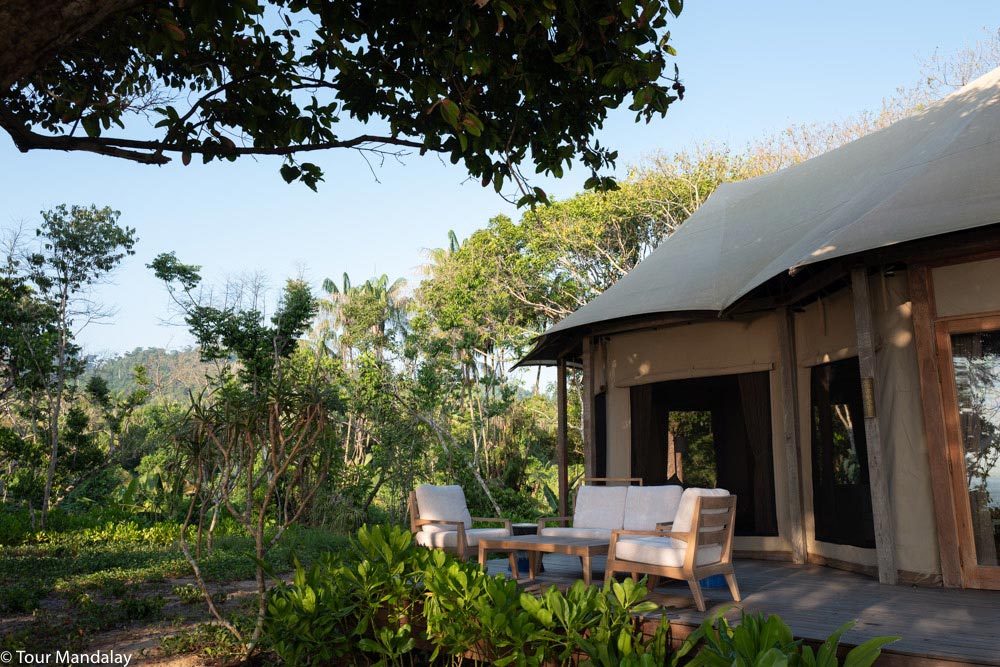
A shaded oasis
With buffed hardwood floors, sisal rugs and more furniture from the exclusive Brownstone collection, the Tented Beach Villas are distinctively more polished and upmarket in style. The floor to ceiling net windows also allow for plenty of light to enter, along with any lingering cool breeze and the sound of lapping waves. Being woken up by this in the morning is particularly delightful.
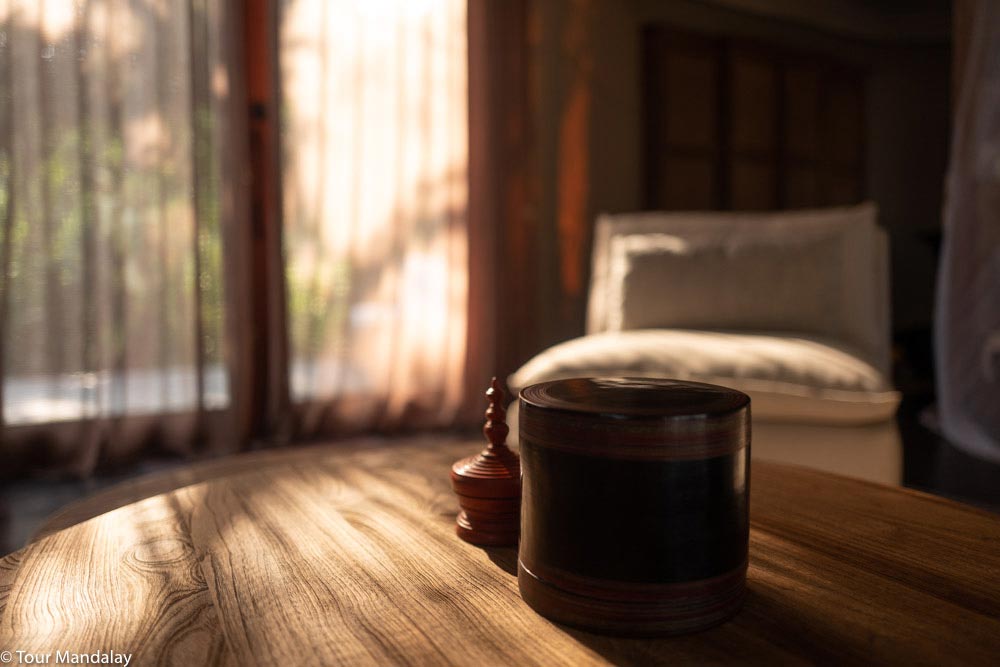
Who needs a morning wake-up call when you have morning light like this?
The real show stopper, as hinted at briefly above, is the bathroom and open-air shower area. With the sound of the ocean on one side and the sound of tropical jungle on the other, never has taking care of business felt so good! Equipped with Gla Nature spa products – a Thailand-based brand that makes its products using South East Asia sourced natural extracts – you’ll also enjoy the wash of your life too.
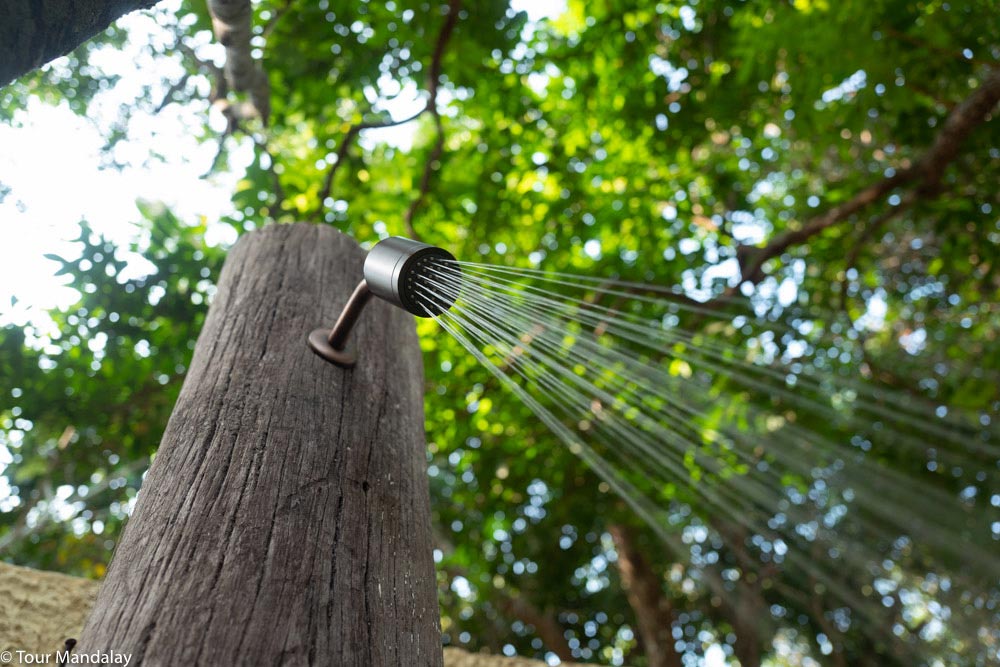
At one with nature
These rooms are a little bit further away from the central restaurant / dining area, which means you’ll need to walk for two to three minutes for breakfast, lunch and dinner; this however is hardly a chore when your feet are cushioned by white sand and turtle nests dot the way. In the evenings, be sure to keep your eyes peeled as you may catch a large mother turtle looking for a spot to safely nest; the small chance of witnessing this spectacle makes every walk back to the Tented Beach Villas an enjoyable task.
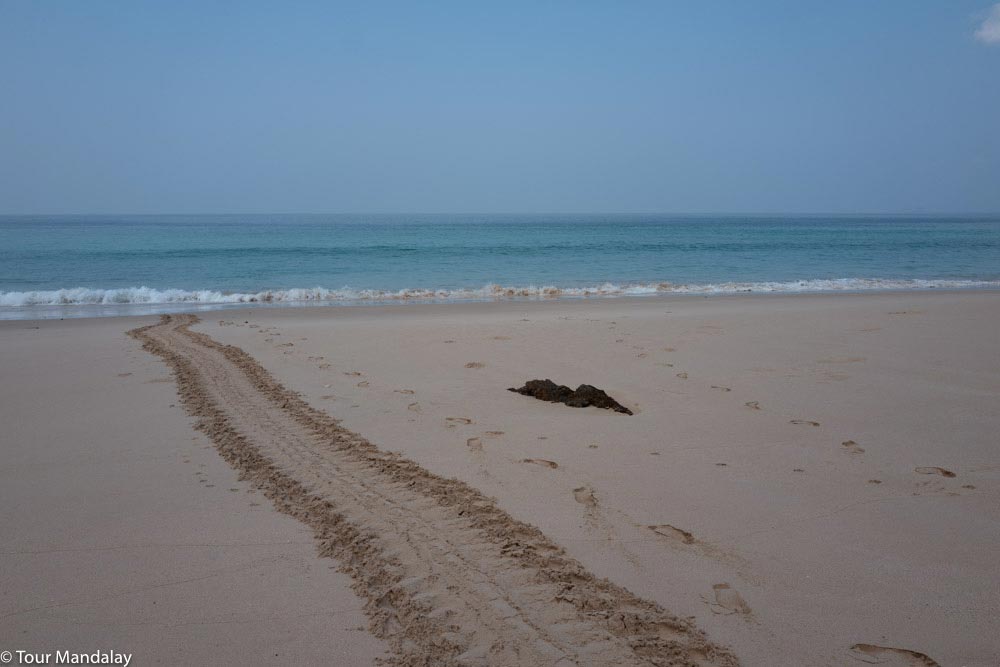
Flipper prints from a mother turtle who successfully laid her eggs
Food & drink
It’s not easy growing and sourcing food on a remote and wild island, especially when you’re catering for full board guests that have arrived expecting a five star experience. This is where Wa Ale really wows.
Ray, the Executive Chef, serves an ever-changing, mostly health focused menu, which changes depending on what’s present and bountiful in Farina’s organic vegetable garden (named after the owner’s wife), local farms and the Andaman Sea. With a large redbrick wood burning oven, you can also expect to be treated to freshly baked bread, pizza and cakes.
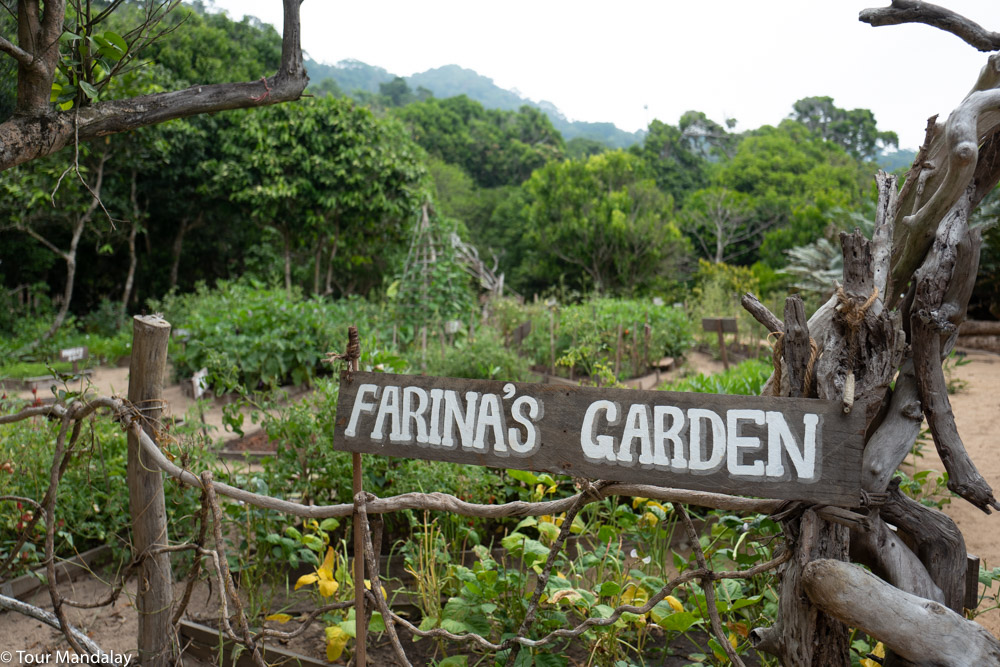
Farina’s organic vegetable garden
Breakfast
This is a relaxed affair with ‘help yourself’ staples such as muesli, granola, seasonal fruit and Myanmar-made honey and yogurt. Once seated, there’s then an ‘unwritten’ a la carte menu, where you can request, within reason, any classic breakfast dish you want. We defaulted to the crispy bacon and poached egg muffins, followed by a generous serving of maple syrup pancakes. The coffee puts Starbucks to shame.
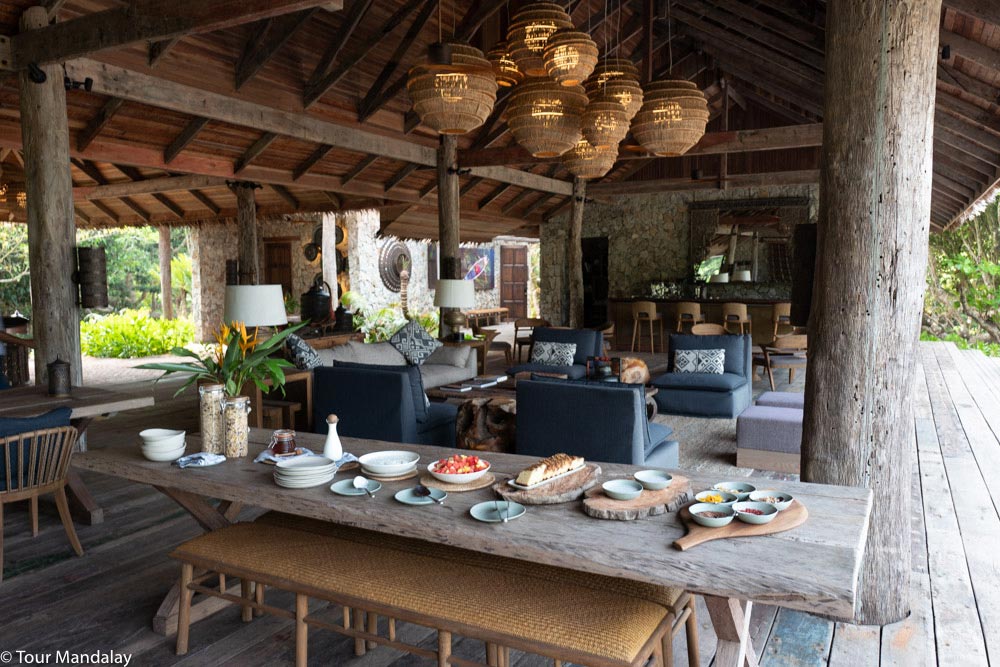
Help yourself breakfast items served in the lobby lounge
Lunch
Served at 1pm, lunch is usually laid out on a big table and introduced by Ray himself. Inspired (we think!), by his time in Australia, the meals we ate were all fresh, healthy, varied and generously portioned. Think quinoa, cucumber and avocado salads, succulent steamed pork boas and chargrilled chicken, olive and mozzarella pizzas. Ray and his team frequently look to incorporate Myanmar flavours and dishes too, so expect a few (pleasant) culinary surprises here and there.
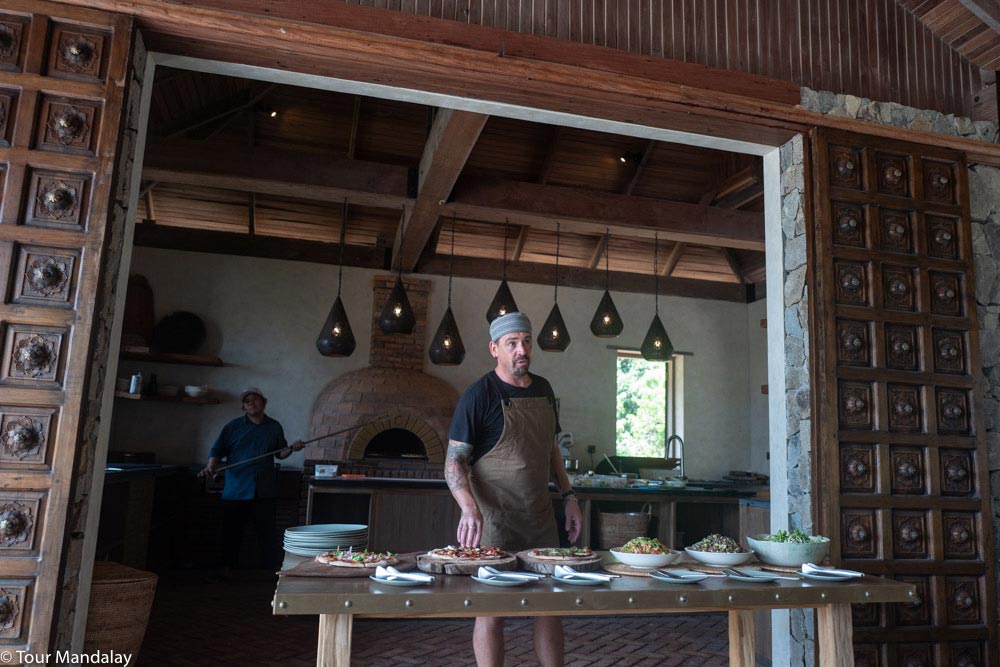
Ray personally introducing the group to a hunger-busting lunch
Dinner
For dinner, the candles come out (and sometime the moon), setting the stage for what can only be described as a gastronomic three-course masterclass. Taking into account any dislikes or allergies you may have (this should ideally be communicated prior to travel), Ray and his team have the ability to conjure up fine dining menus that wouldn’t look out of place at a Joel Robuchon restaurant. Ray, or Aung Soe (Ray’s right-hand man), will also personally introduce the dinner, providing you that intimacy and exclusivity that travellers at this level come in search of.
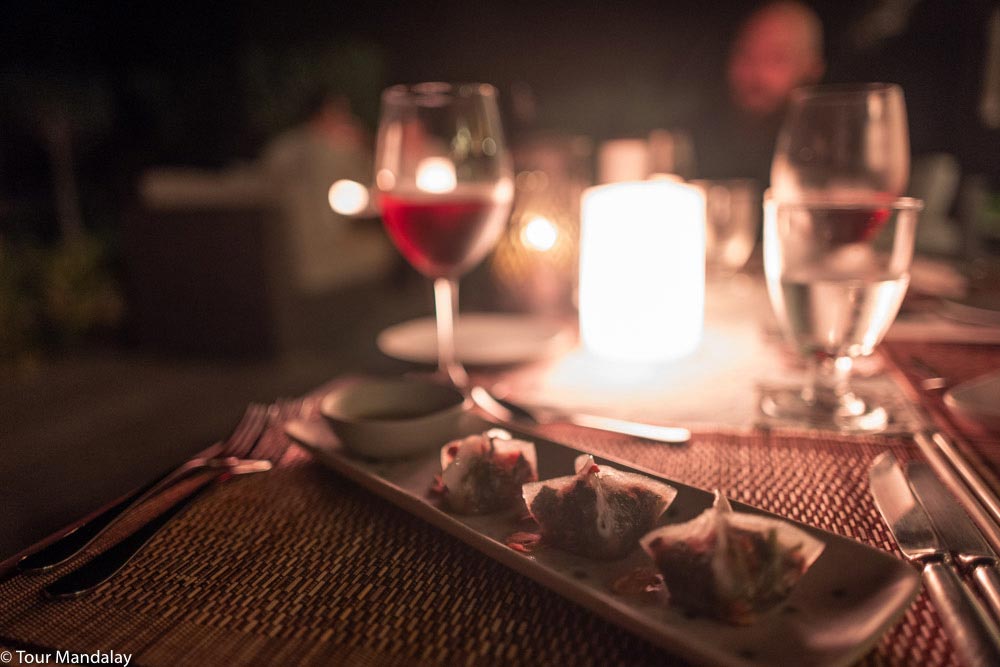
Candle lit dinner with friends
Drinks
With a handpicked fine wine and whisky selection (that’s apparently Ray’s favourite tipple), there’s nothing stopping you from pushing the boat out a little bit more. That said, the house white, red and rose we sampled, were good enough that we didn’t feel the need to upgrade. Cocktails are also shaken (and stirred), with our favourite being the spicy, ginger, lime and chilli infused ‘Wa Ale Signature’; credit to Win Thu, the creator.
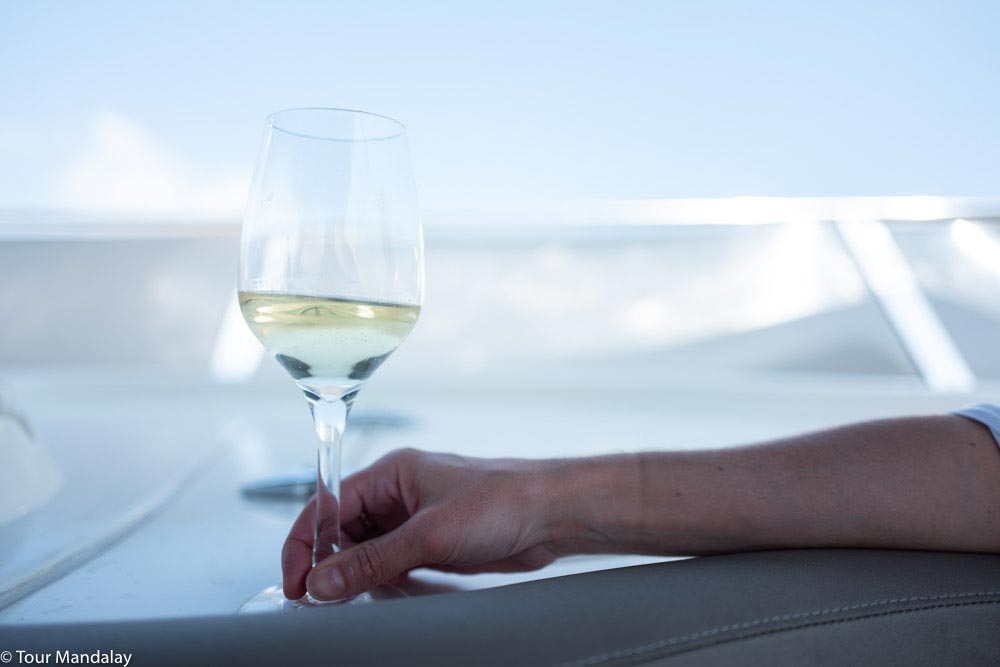
House white wine sourced from a Rothschild vineyard
To clarify, excluding the premium wine list and select spirits, Wa Ale is full-board, so all of the above is factored into the room rate.
Things to do
Wa Ale may be deserted, but it’s unlikely you’ll ever find yourself twiddling thumbs. From rejuvenating jungle treks to kayaking through the island’s bordering mangroves, it’s easy to stay active whilst enjoying the best of the resort’s natural wonders.
Spending a few hours out at sea on a stand up paddle board also comes highly recommended; don’t forget to bring a snorkel and a pair of fins to explore the deserted coves and the patches of shallow reef (Greg at the Wa Ale dive centre will happily provide these).
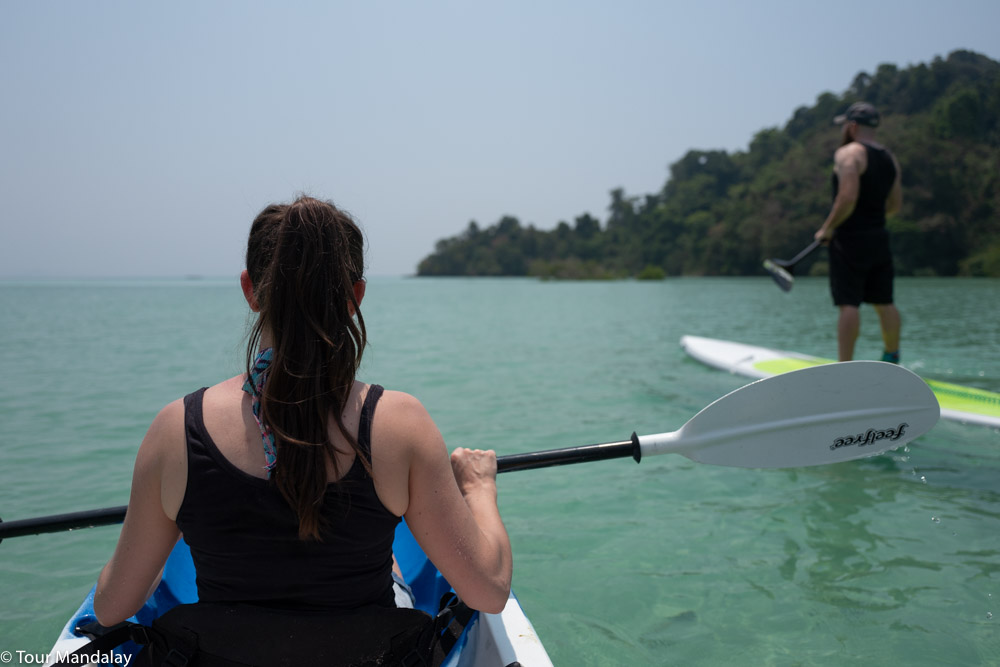
Using a kayak or stand up paddle board is the best way to explore Wa Ale’s immediate waters
For guests with the relevant certification, deep sea dives can also be arranged at a range of sites catering for all levels. Without dive certification, it will still be possible to arrange an open water course and beginner lessons (for adults and children) with a PADI qualified instructor. If you’re just starting out, the Mergui Archipelago’s calm waters make the thought of going under a lot less intimidating. Please note that all dive excursions, regardless of level, are chargeable.
For a rewarding culture focused half day out, a visit to one of the nearby Moken ‘sea gypsy’ villages can easily be arranged. With an estimated worldwide population of 3,000, and their nomadic way of life increasingly under threat, this is a unique opportunity to meet with community elders onshore and learn about ‘their Mergui’. Through the Lampi Foundation, Wa Ale supports schools and a medical clinic in the Moken villages of Salet Galet and May Kyone Galet; the respective community’s welfare is something the owners clearly care passionately about, and it’s warming to know that some of the money made from tourism in the region – especially when images of Moken people are being used regularly to market the destination – is being put to good use.
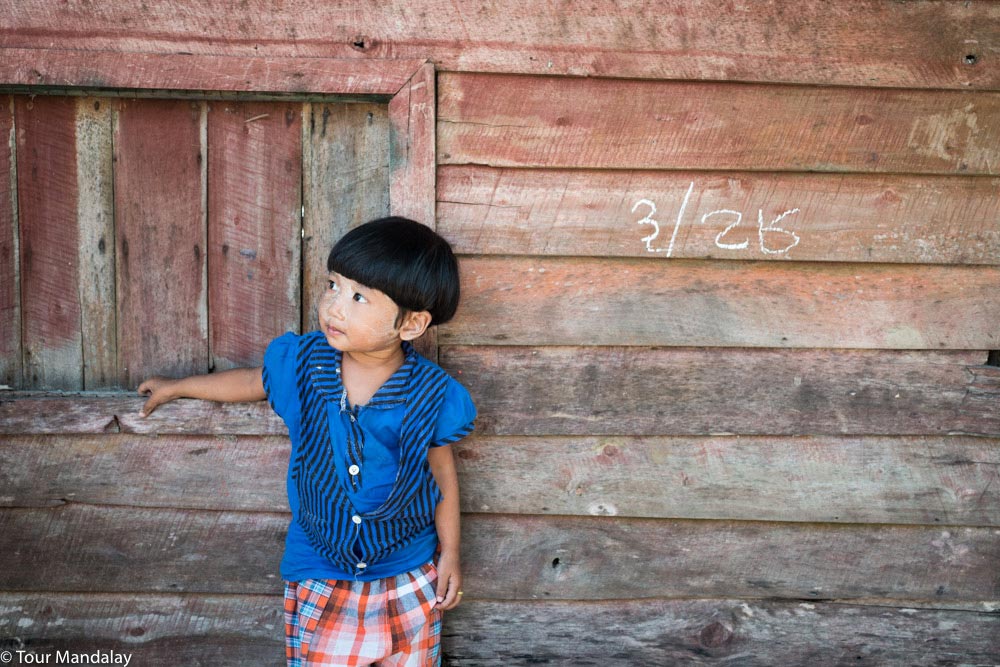
Wa Ale has pledged support to schools and clinics in two Moken villages
Still have energy to burn after snorkelling and your first-hand encounter with the Moken? The ‘Jungle Gym’ with its dumbbells and suspension ropes is the perfect place to let off some steam. Alternatively, for something more sedate and mind indulging, you can join Laurel (the ‘Wellness Specialist’) here for a one-on-one yoga or reiki class. These sessions are best complimented with a private massage from Sisi back in the comfort of your villa.
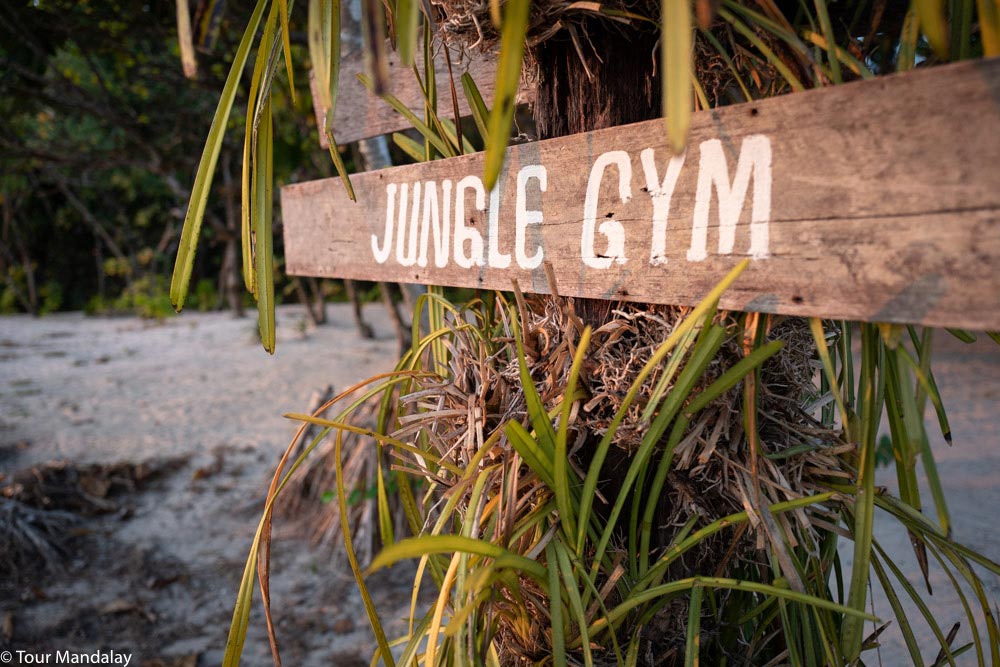
A gym fit for Tarzan
Last but not least, put you feet up. Resorts in South East Asia are quick to wax-lyrical about “barefoot luxury”, but very few make you feel comfortable enough to ever want to test that concept; there’s simply far too much stuffiness and pretence. This is not the case at Wa Ale.
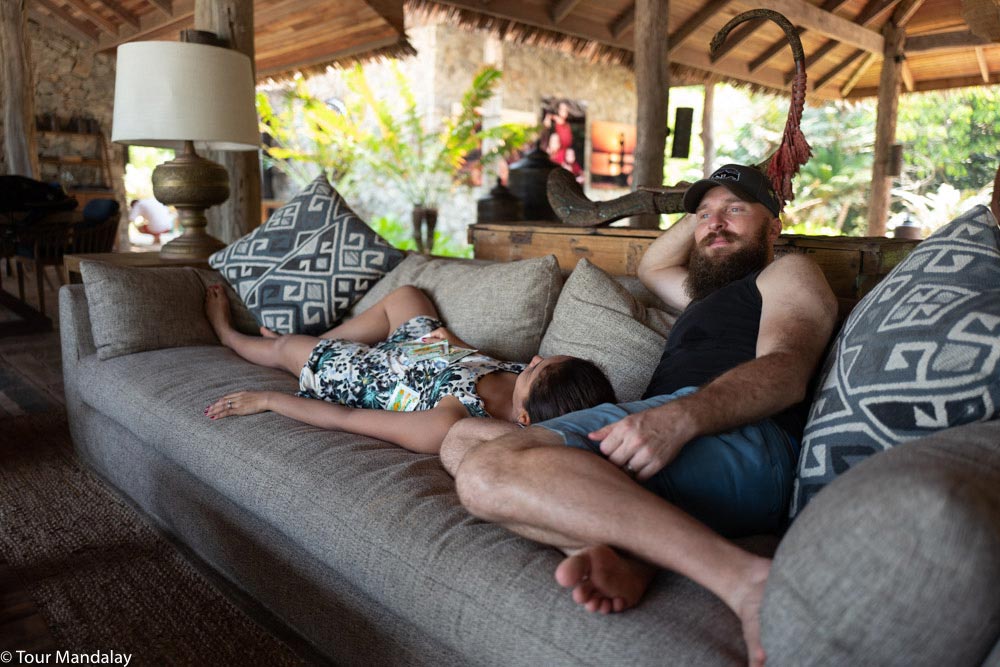
Real barefoot luxury
Relaxation at Wa Ale isn’t just about massages, yoga, reiki and lounging around; there’s no shortage of secluded spots to read, play board games and attain some quality headspace. Nowhere is this perhaps better enjoyed than from the River Cafe deck, a shaded green space overlooking what can best be described as a tranquil mangrove lagoon.
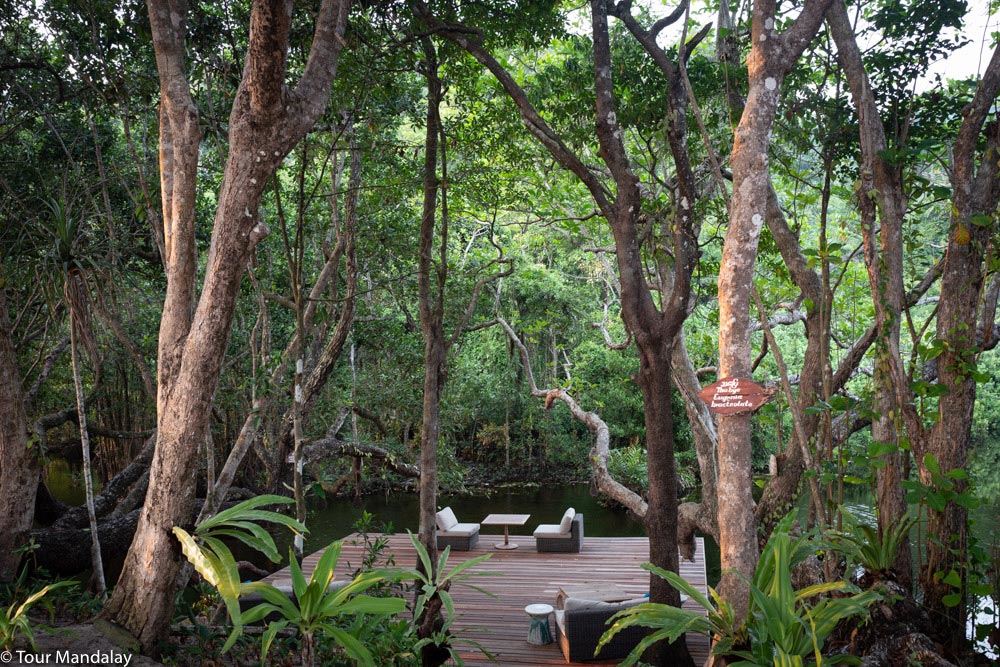
Wa Ale’s River Cafe Deck, an easy place to switch off for a few hours
For sunset, the River Cafe itself is the place to be, with its bean bag seating, lanterns and Myanmar parasols. There’s also a dedicated bartender on standby, giving you all the more reason to gather and admire the horizon’s changing palette of warm coloured hues.
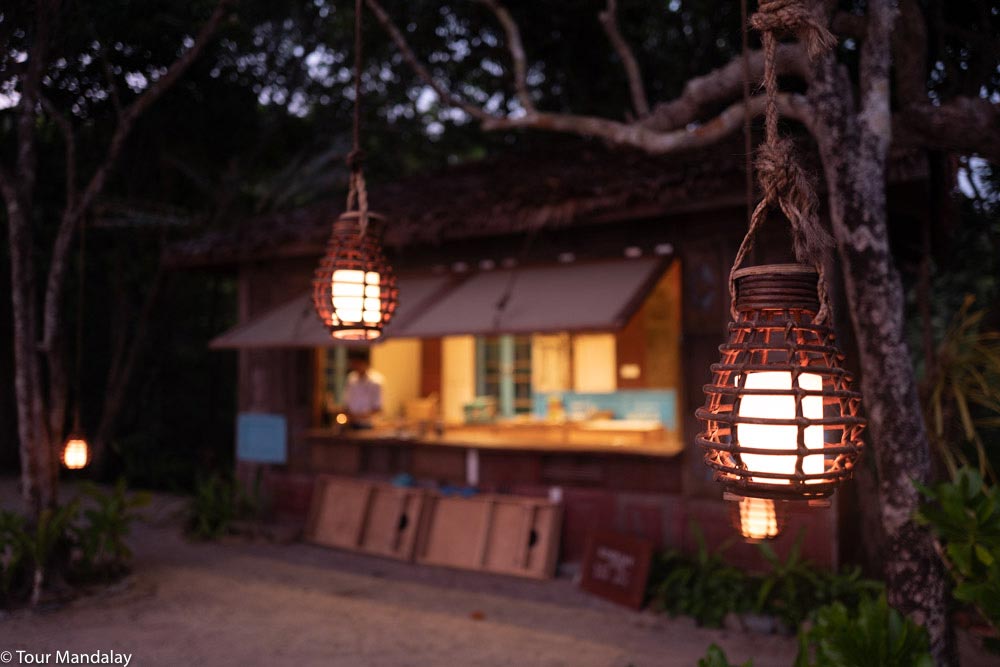
Shortly after sunset at the River Cafe
If that doesn’t float your boat then there’s always sunset cornhole…
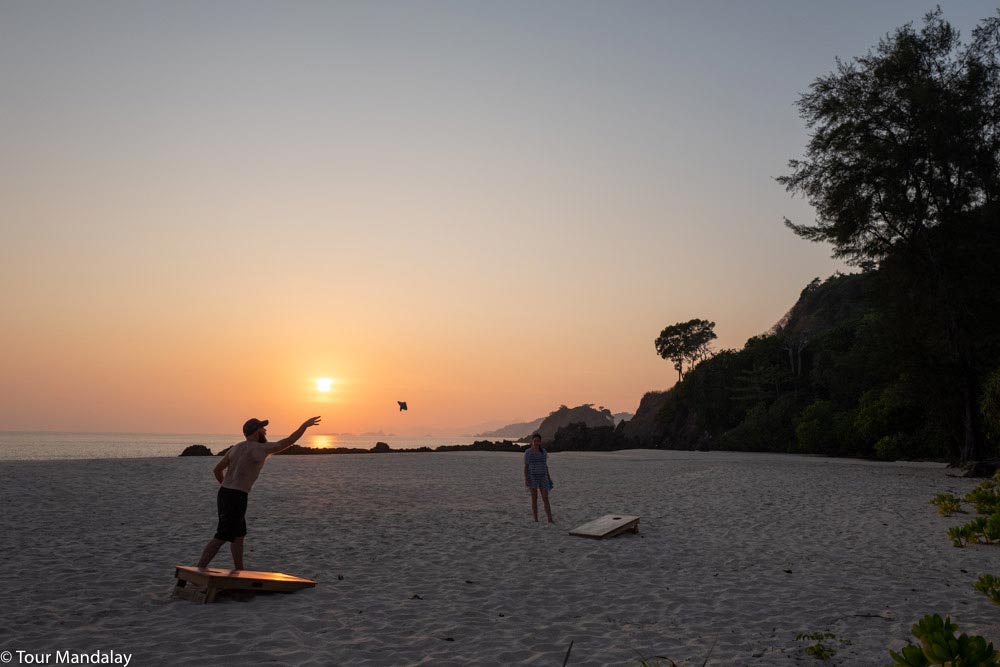
Enjoying a game of cornhole at sunset
What makes Wa Ale special?
As mentioned previously, when we first caught wind of Wa Ale’s ambitious plans, we were openly sceptical; it’s remote, it’s seasonal, there are environmental issues that need to be addressed, and it’s going to set you back at least one thousand US dollars a night.
A husband and wife team is always going to be personal and that shone through in the hospitality provided by Alyssa and Ray. It wasn’t generic, it wasn’t text book, it was simply from the heart. One of the best examples, we thought, of this was the handwritten note received from Alyssa waiting in our Tented Beach Villa. Granted, it’s a small touch, but it’s one that left us with a lasting impression. Nowadays, how many hotels or resorts can say they genuinely do this (and printed versions don’t count!)?
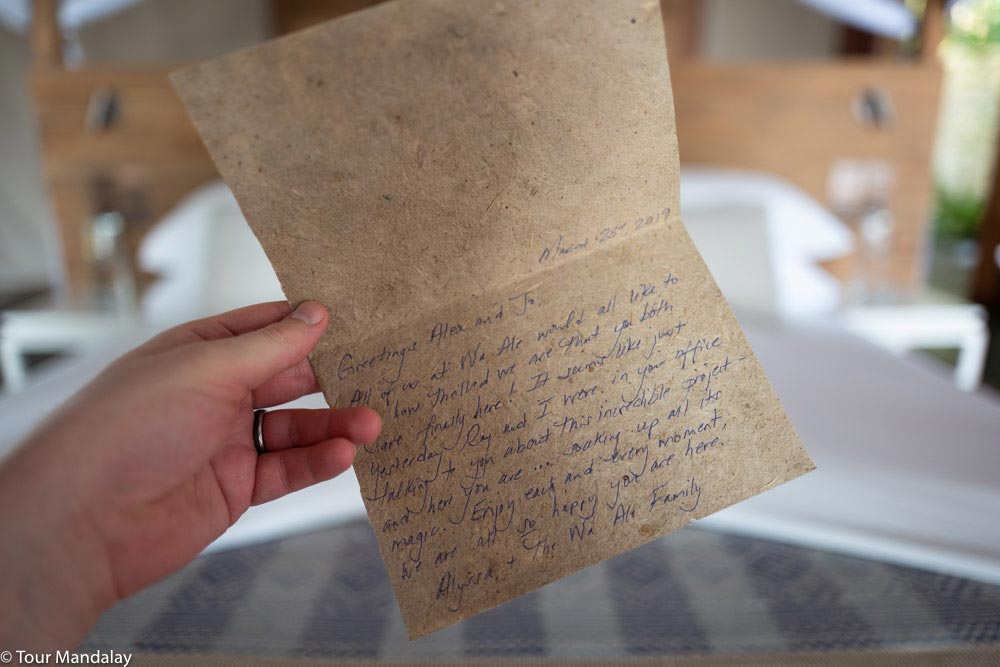
A handwritten note from Alyssa
Most of the wood you can find on Wa Ale, whether it’s the wood used for furniture or the wood used to construct the Treetop Villas, is reclaimed. The resulting shabby chic style blends harmoniously with Wa Ale island’s surrounds and best of all, it doesn’t feel permanently fixed into deep and damaging concrete foundations; if the Wa Ale team wanted to leave the island without a trace (not that they would!), everything could be taken away without much effort. It’s all very low impact.
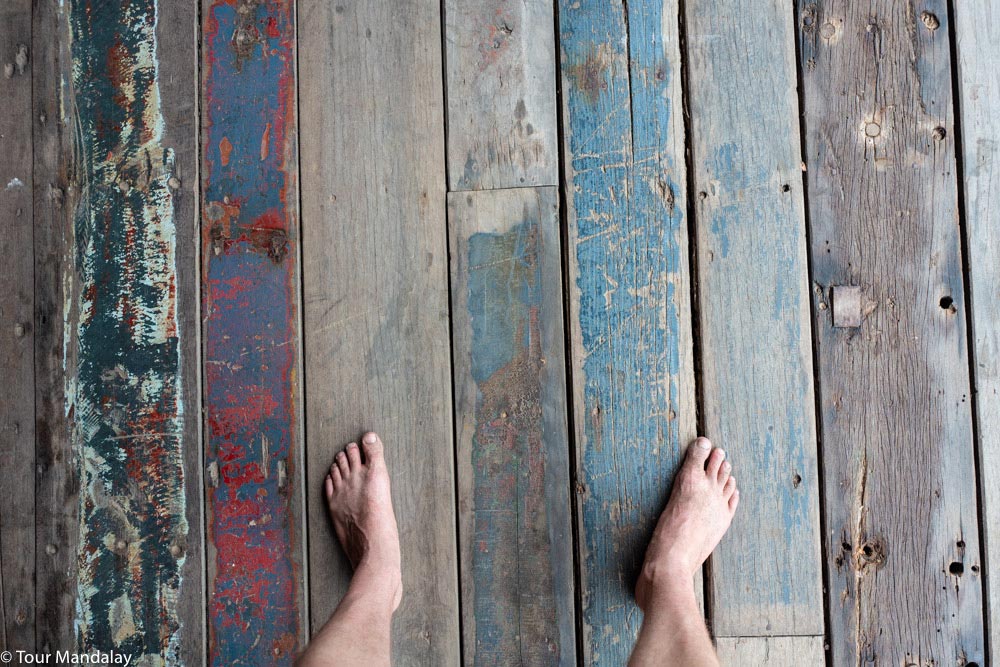
Who says old can’t be beautiful?
You also won’t find any power lines or generators; Wa Ale is 100% solar powered. Unsurprisingly, having no air-conditioning units, hair dryers and mini-bars massively helps to conserve energy consumption, so much so that we had no issue with power shortages or hot water during any point of our stay. With a rapidly increasing global awareness of the issues caused by climate change, we wouldn’t be surprised if the next decade starts seeing travellers (from backpackers to high-end) request properties with energy installations like this as standard.
More than 8 million tonnes of plastic are dumped in our oceans every year and if current trends continue, it’s predicted there will be more plastic than fish by 2050. Individuals, businesses and governments will need to think and act fast if we’re going to prevent that from happening. Wanting to do their part, Wa Ale only provides reusable bottles, which can be refilled using filtered water sourced directly from the resort’s taps (a first for Myanmar hotels and resorts). Plastic straws are avoided and toiletries are refilled, or recycled, as and when necessary. Thanks to the extended canine family and the practise of composting, food waste is rarely an issue either. Remember, one of the dogs, Jabo, even walks up and down Turtle Beach collecting small pieces of washed up litter in his neck pouch. Rather than dumping into an in-house landfill site – this does happen elsewhere in the region – Wa Ale choose to take any unavoidable waste back to Kawthaung.
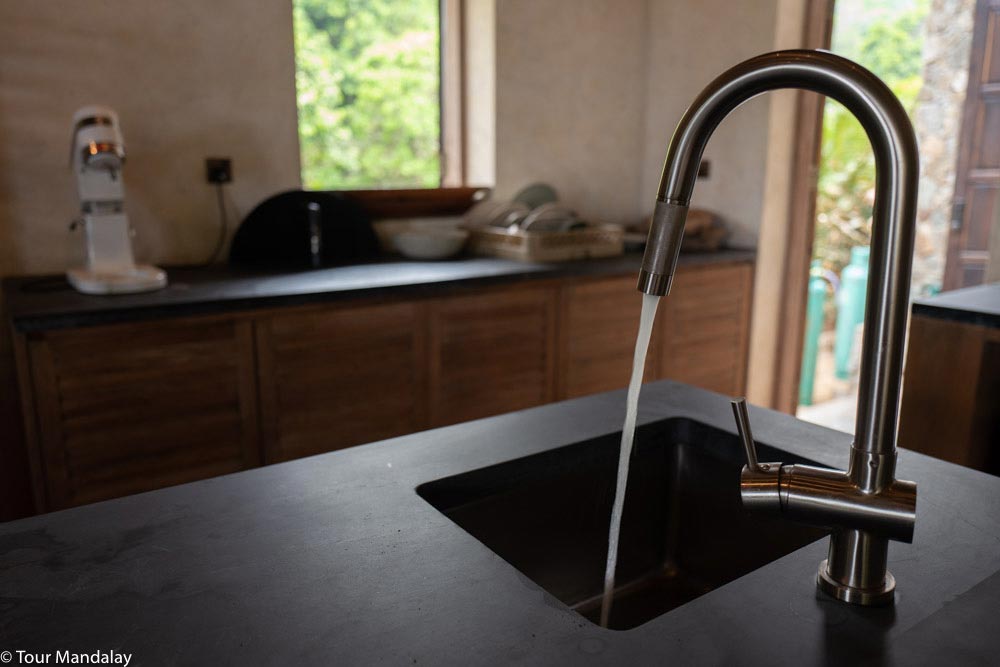
Drinkable water runs directly from all of Wa Ale’s taps
As touched on briefly above, Wa Ale has also established the Lampi Foundation to help fund social welfare and conservation projects in the area. Through eco-tourism, the resort pledges to annually donate 20% of net profits and 2% of room revenue to the foundation. This money is then used to help with the general preservation of the Lampi Marine National Park, build schools, support clinics and provide a safe(er) nesting environment for sea turtles to thrive. Just to make clear, Wa Ale is not looking to interfere with nature’s natural balance here, all it wants to do is restore it; due to the region’s shut off nature, us humans have been left free to poach these vulnerable reptiles for years. Clearly sensing Wa Ale has a good vibe, pregnant turtles now flock to the shore, which was made evident from the seven nests and flipper prints we saw.
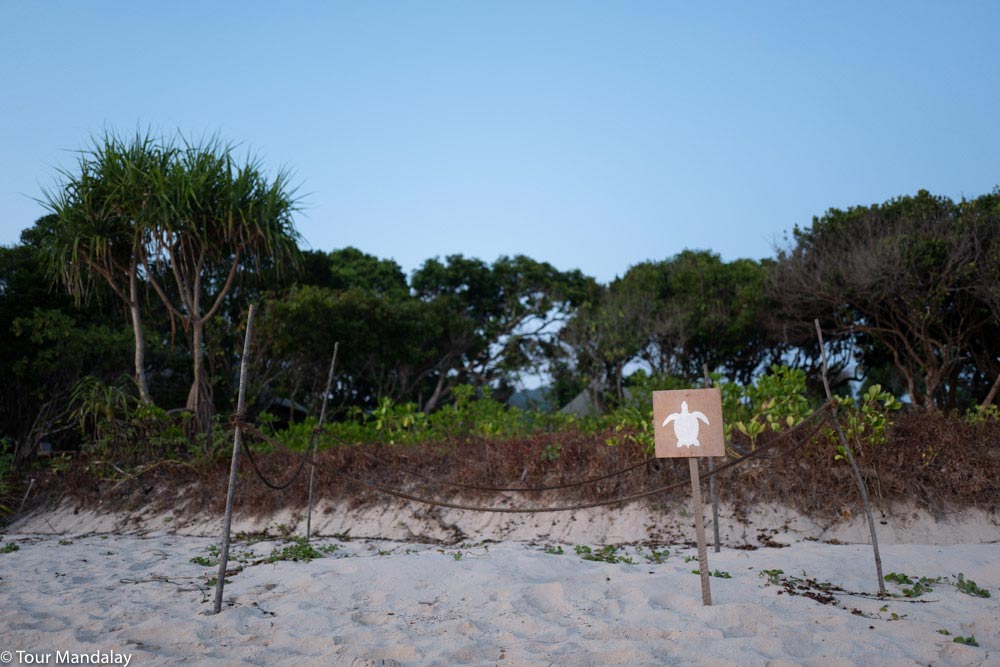
A roped off sea turtle nest in front of one of Wa Ale’s Tented Beach Villas
Myanmar’s government has also taken an interest in the work Wa Ale are doing. In February 2019, Daw Aung San Suu Kyi graced the island with her presence, keen to look at ways to encourage conservancy in the Lampi Marine National Park. This resulted in a commitment by the government to step up its efforts to protect the immediate area around the National Park, with Forestry Department patrol boats now being deployed to halt all fishing activity within a certain radius and to ward off potential poachers. The green lights of the squid fishing boats can still be seen on the horizon – a common sight on Mergui’s waters – but they’re now no longer as close, a sure sign that the initiative is working.
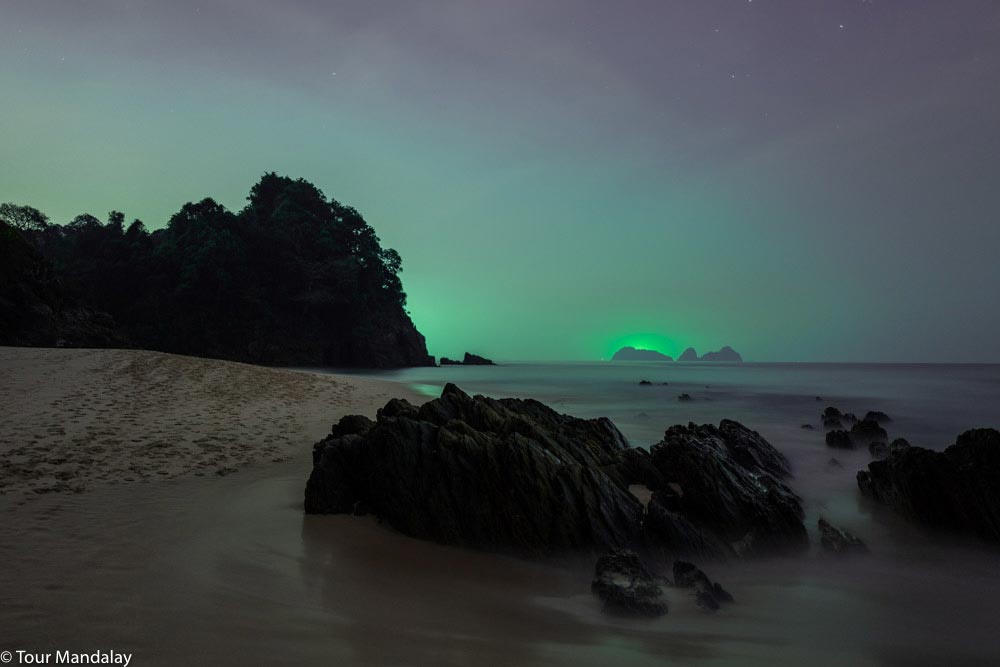
A glowing green horizon
With the desire to invest in the region at an all time high, let’s hope these newcomers will take heed of Wa Ale’s small-scale, sustainable and conservation-focused business model. Whilst it’s certainly true of Tour Mandalay’s partners and direct travellers, this is what most people come to Myanmar in search of; they don’t want big, brash and impersonal, they want small, humble and intimate. They want the money they spend in country to genuinely make a difference, whether that’s by supporting the people of the communities they visit, conserving wild and remote habitats, or by helping to reduce environmental pollution. Wa Ale gets this – it’s written into their DNA – and it’s surely only going to be a matter of time until everyone else does.
Come to Myanmar and stay at Wa Ale. It’ll be the best decision you ever made.
Getting there
There are multiple ways to reach Wa Ale:
From Yangon
Take a 1.5 hour domestic flight, followed by a 15 minute car journey to Kawthaung Jetty. From here, it’s then a 1 hour 40 minute to 2 hour luxury speedboat or RIB ride to Wa Ale (dependent on wave and weather conditions).
From Bangkok
Take a 1 hour and 20 minute flight to Ranong, followed by a 30 minute transfer by car to Ranong Jetty. Having cleared Thai immigration, take a short boat journey across to Kawthaung. From here, it’s then a 1 hour 40 minute to 2 hour luxury speedboat or RIB ride to Wa Ale (dependent on wave and weather conditions).
From Phuket
Same as above, only it will involve a 3.5 hour car transfer directly to Ranong Pier.
Some important points to note:
- Wa Ale’s one of those ‘save the best until last’ properties. By all means, go there first – you’ll have an amazing time – but you’re likely to suffer major withdrawal symptoms. For Myanmar itineraries, it would be wise to start in Mandalay, before making yourself down (or around) to Kawthaung via Yangon. You can then transfer overland into Thailand and fly from Ranong to Bangkok before connecting with your international flight.
- Complimentary transfers from Kawthaung to Wa Ale operate on Saturdays and Tuesdays only. Outside of these days, a supplementary transfer charge will apply (USD250 per person return and USD170 one way). If you want to make it work with these days, you’ll be looking at a 3, 4, or 7 night itinerary.
- Complimentary or supplementary, the boat transfers are not private; you will be expected to share with other guests if present.
- The boat transfer from Kawthaung Jetty to Wa Ale departs by 14:00 at the latest. It will be necessary to book domestic flights to coincide with this. The return transfer departs Wa Ale at 08:00.
- In adverse weather conditions, you will be transferred from Kawthaung to Aung Ba (and vice versa); this is a drive of approximately 2 hours. From Aung Ba, the boat journey to Wa Ale will take approximately 1 hour.
For more information and to book, please get in touch by writing to info@tourmandalay.travel.

